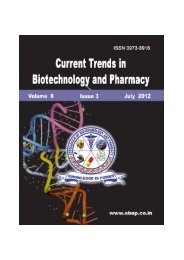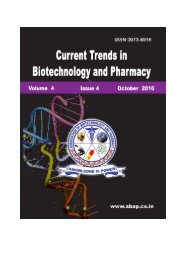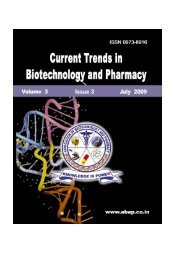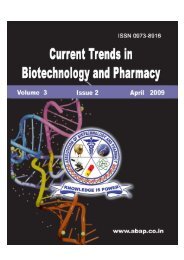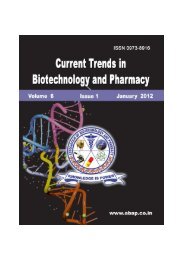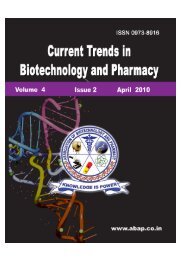d(GC) - Association of Biotechnology and Pharmacy
d(GC) - Association of Biotechnology and Pharmacy
d(GC) - Association of Biotechnology and Pharmacy
Create successful ePaper yourself
Turn your PDF publications into a flip-book with our unique Google optimized e-Paper software.
Current Trends in <strong>Biotechnology</strong> <strong>and</strong> <strong>Pharmacy</strong><br />
Vol. 6 (2) 210-221 April 2012, ISSN 0973-8916 (Print), 2230-7303 (Online)<br />
Adaptogenic activity : Adaptogenic drugs are<br />
those which are useful to counteract stressful<br />
factors by promoting non-specific resistance <strong>of</strong><br />
the body (22). Antiulcerogenic action <strong>of</strong> an<br />
ayurvedic herbo-mineral formulation ‘Satavari<br />
m<strong>and</strong>ur’ (SM) was investigated for its efficacy in<br />
the treatment <strong>of</strong> coldrestraint stress-induced<br />
gastric ulcer in rats (23). Rege et al., (24)<br />
administered orally the aqueous, st<strong>and</strong>ardized<br />
extract <strong>of</strong> Asparagus racemosus to experimental<br />
animals, following which they were exposed to a<br />
variety <strong>of</strong> biological, physical <strong>and</strong> chemical<br />
stresses. Bhattacharya et al., (25) undertook a<br />
study to investigate the adaptogenic activity <strong>of</strong><br />
‘Siotone’ (a herbal formulation consisting <strong>of</strong><br />
Withania somnifera, Ocimum sanctum,<br />
Asparagus racemosus Willd., Tríbulus terristris<br />
<strong>and</strong> shilajit) against chronic unpredictable, but<br />
mild, foot shock stress induced perturbations in<br />
behaviour (depression), glucose metabolism,<br />
suppressed male sexual behaviour,<br />
immunosuppression <strong>and</strong> cognitive dysfunction in<br />
albino rats<br />
Anti-diarrhea activity : Diarrhea is increased<br />
fluidity, frequency or volume <strong>of</strong> bowel<br />
movements. It may be acute or chronic. Since<br />
the Asparagus racemosus Willd. root extract is<br />
composed <strong>of</strong> saponins, alkaloids, flavonoids,<br />
sterols <strong>and</strong> terpenes its root has been used<br />
traditionally in Ayurveda for the treatment <strong>of</strong><br />
diarrhoea <strong>and</strong> dysentery. The plant extracts<br />
showed significant inhibitor activity against castor<br />
oil induced diarrhoea <strong>and</strong> PGE 2 induced<br />
enteropooling in rats. Both extracts also showed<br />
significant reduction in gastrointestinal motility in<br />
charcoal meal test in rats (26). It has been<br />
reported that asparagus decreases gastric<br />
emptying time (27). Nanal et al., (28) found<br />
Satavari to be extremely effective in the treatment<br />
<strong>of</strong> Atisar (diarrhoea), Pravahika (dysentery) <strong>and</strong><br />
Pittaj shool (gastritis) as described in Ayurvedic<br />
texts such as Sushruta Samhita <strong>and</strong><br />
Sharangdhar Samhita. Ethanol <strong>and</strong> aqueous<br />
extracts <strong>of</strong> Asparagus racemosus Willd. roots<br />
Vital medicine Asparagus racemosus willd<br />
212<br />
exhibited significant anti-diarrhoeal activity<br />
against castor oil induced diarrhoea in rats<br />
demonstrating an activity similar to<br />
loperamide(26). Other studies have shown that<br />
the methanolic extracts <strong>of</strong> asparagus root<br />
reduced intestinal propulsive movement, castor<br />
oil-induced diarrhoea <strong>and</strong> intestinal fluid<br />
accumulation (29).<br />
Anti ulceric activity : In Ayurveda, Asparagus<br />
racemosus Willd. has also been mentioned for<br />
the treatment <strong>of</strong> ulcerative disorders <strong>of</strong> stomach<br />
<strong>and</strong> Parinama Sula, a clinical entity akin to the<br />
duodenal ulcer diseases (30). Nanal et al., (28)<br />
studied the effect <strong>of</strong> Asparagus racemosus Willd.<br />
on Amlapitta (hyperacidity), Grahani (ulcerative<br />
colitis), Parinam shool (septic ulcer) <strong>and</strong> Vataj<br />
shool (spastic colon) <strong>and</strong> observed an<br />
amelioration <strong>of</strong> symptoms. Singh et al.,(31)<br />
showed that Shatavari promptly <strong>and</strong> persistently<br />
relieve the pain <strong>and</strong> burning sensation as well<br />
as other dyspeptic symptoms due to duodenal<br />
ulcer. The juice <strong>of</strong> fresh root <strong>of</strong> Asparagus<br />
racemosus Willd. has been shown to have<br />
definite curative effect in patients <strong>of</strong> duodenal<br />
ulcers Mangal et al., (32) had done his study on<br />
human <strong>and</strong> found that Asparagus racemosus<br />
Willd. treatment increase lifespan <strong>of</strong> gastric<br />
mucosal epithelium cells as well as secretion <strong>and</strong><br />
viscosity <strong>of</strong> gastric mucus. Antiulcerogenic action<br />
<strong>of</strong> an ayurvedic herbo-mineral formulation<br />
‘Satavari m<strong>and</strong>ur’ (SM) was investigated for its<br />
efficacy in the treatment <strong>of</strong> coldrestraint stressinduced<br />
gastric ulcer in rats (23). Asparagus<br />
racemosus Willd. along with Terminalia chebula<br />
reported to protect gastric mucosa against<br />
pentagastrin <strong>and</strong> carbachol induced ulcers, by<br />
significantly reducing both severity <strong>of</strong> ulceration<br />
<strong>and</strong> ulcer index (33). In another study by Sairam<br />
et al.,(34), the methanolic extract <strong>of</strong> fresh roots<br />
<strong>of</strong> Asparagus racemosus showed significant<br />
protection against acute gastric ulcers induced<br />
by cold restraint stress, acetic acid, pylorus<br />
ligation, aspirin plus pylorus ligation <strong>and</strong><br />
cysteamine induced duodenal ulcers. Bhatnagar



